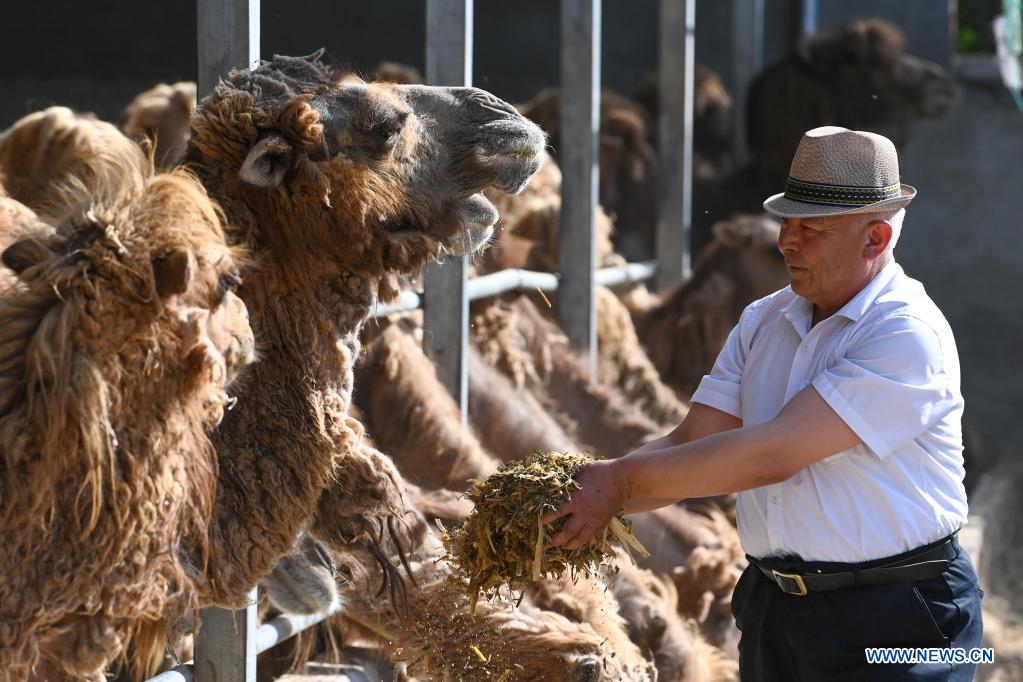
A man feeds camels at an organic cultivation base of a dairy company in Yining county in Kazak autonomous prefecture of Ili, Northwest China's Xinjiang Uygur autonomous region, May 27, 2021. In recent years, Yining has optimized the local animal husbandry industrial structure to improve on how the industry develops. Meanwhile, more science-based steps have been taken to achieve economies of scale and increase farmers' income. [Photo/Xinhua]
Respecting people's choices has always been the top priority of the Xinjiang Uygur autonomous region government when it comes to drafting employment policies, Xinjiang officials said on Thursday.
This especially applies to employment services and job searches in rural areas where "not a single person" has been forced to work outside their hometowns or do work they don't want to, the officials said.
With the help of employment agencies, many young people wanting to earn better incomes have chosen to find jobs with companies and in factories outside Xinjiang. Their monthly income is significantly higher than what they would earn doing farm work at home, Rehmanjan Dawut, director of the Xinjiang regional Human Resources and Social Security Bureau, said at a news conference in Beijing.
"The fundamental principle of helping people seeking employment outside their hometowns is to fully respect their personal choices. Not a single person has been forced to work elsewhere or do a job that they don't want to."
Some Western anti-China forces have fabricated lies and accused Xinjiang of tolerating "forced labor", and they have labeled the region's moves to offer people in rural areas jobs in other parts of Xinjiang, or outside the region, as evidence of "forced labor."
In fact, job opportunities away from people's hometowns are part of the region's poverty alleviation measures, Rehmanjan said. They give people from southern Xinjiang, with its harsh natural terrain and limited employment opportunities, the chance to earn higher incomes, he said.
"It's only natural for people to choose jobs with better pay. Some can make their family's total annual income in just a few months. Furthermore, some have returned home and become members of the management team of local companies after gaining experience," he said.
In the process of assisting people from ethnic groups, such as the Uygurs, to find jobs, local governments have helped by collecting information on job opportunities and improving employment service platforms. The regional government has also been offering support to those who want to start their own businesses, Rehmanjan said.
"It's up to the people to decide what they want to do and where they want to work. Their personal movement has never been restricted," he added.
A supervision system has been enforced in private companies in the region to ensure workers' rights-including respecting their religious beliefs and ethnic cultures-are fully protected, Nurli Unus, vice-president of the Xinjiang Federation of Industry and Commerce, said at the news conference.
Last year, micro, small and medium-sized private businesses provided jobs for 179,500 people. "We have received no claim of 'forced labor' from any of the workers," Nurli said.
Some Western countries, including the United States, have sanctioned some companies operating in Xinjiang over false allegations of "forced labor". Huafu Colored Spinning Company in the southern city of Xinjiang's Aksu is one of them.
Akbar Turhon, an employee of the company, said many foreign observers have visited the company since he started working there in 2016. They have communicated with the workers and seen how well they have been treated, Akbar said.
"The sanctions have hurt our feelings. More importantly, we feel very angry because they (Western countries) have actually violated our rights to work in the name of 'caring for Uygurs'," he added.








